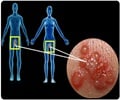Link between Alzheimer's disease and herpes virus infection has been identified by a research team at the University of Manchester. The research suggests that herpes treatment with aggressive antiviral drugs may reduce the risk of dementia.
- A link between Alzheimer's disease and herpes virus has been identified.
- Herpes simplex virus type-1 leads to an increased risk of developing Alzheimer's disease.
- Aggressive antiviral drugs for herpes treatment may reduce dementia risk.
"This article and two others by different research groups in Taiwan provide the first population evidence for a causal link between herpes virus infection and Alzheimer's disease, a hugely important finding," said Professor Itzhaki.
The research team argues that they provide the strongest evidence yet for a causal link between herpes infection and Alzheimer's disease, backing 30 years of research by Professor Itzhaki.
Professor Itzhaki said: "I believe we are the first to realise the implications of these striking data on this devastating condition which principally affects the elderly. No effective treatments are yet available.
"Almost 30 million people worldwide suffer from it and sadly, this figure will rise as longevity increases.
"It also raises the future possibility of preventing the disease by vaccination against the virus in infancy.
Most Alzheimer's disease researchers investigate its main characteristics - amyloid plaques and neurofibrillary tangles; however, despite the vast amount of research, the causes of their formation are unknown.
HSV1 infects most humans in youth or later and remains lifelong in the body in dormant form within the peripheral nervous system.
From time to time the virus becomes activated and in some people it then causes visible damage in the form of cold sores.
The Taiwanese study identified 8,362 subjects aged 50 or more during the period January to December 2000 who were newly diagnosed with severe HSV infection.
The study group was compared to a control group of 25,086 people with no evidence of HSV infection.
The authors then monitored the development of dementia in these individuals over a follow-up period of 10 years between 2001 and 2010.
The risk of developing dementia in the HSV group was increased by a factor of 2.542. But, when the authors compared those among the HSV cohort who were treated with antiviral therapy versus those who did not receive it, there was a dramatic tenfold reduction in the later incidence of dementia over 10 years.
Professor Richard Lathe added: "Not only is the magnitude of the antiviral effect remarkable, but also the fact that, despite the relatively brief duration and the timing of treatment, in most patients severely affected by HSV1 it appeared to prevent the long-term damage in brain that results in Alzheimer's.
Professor Itzhaki said: "It was as long ago as 1991 when we discovered that, in many elderly people infected with HSV1, the virus is present also in the brain, and then in 1997 that it confers a strong risk of Alzheimer's disease in the brain of people who have a specific genetic factor.
"In 2009, we went on to show that HSV DNA is inside amyloid plaques in Alzheimer's patients' brains. "We suggested that the virus in the brain is reactivated by certain events such as stress, immunosuppression, and infection/inflammation elsewhere.
"So we believe the cycle of HSV1 reactivation in the brain eventually causes Alzheimer's in at least some patients."
References:
- Herpes Viruses and Senile Dementia: First Population Evidence for a Causal Link - (http://dx.doi.org/10.3233/JAD-180266)
Source-Eurekalert















